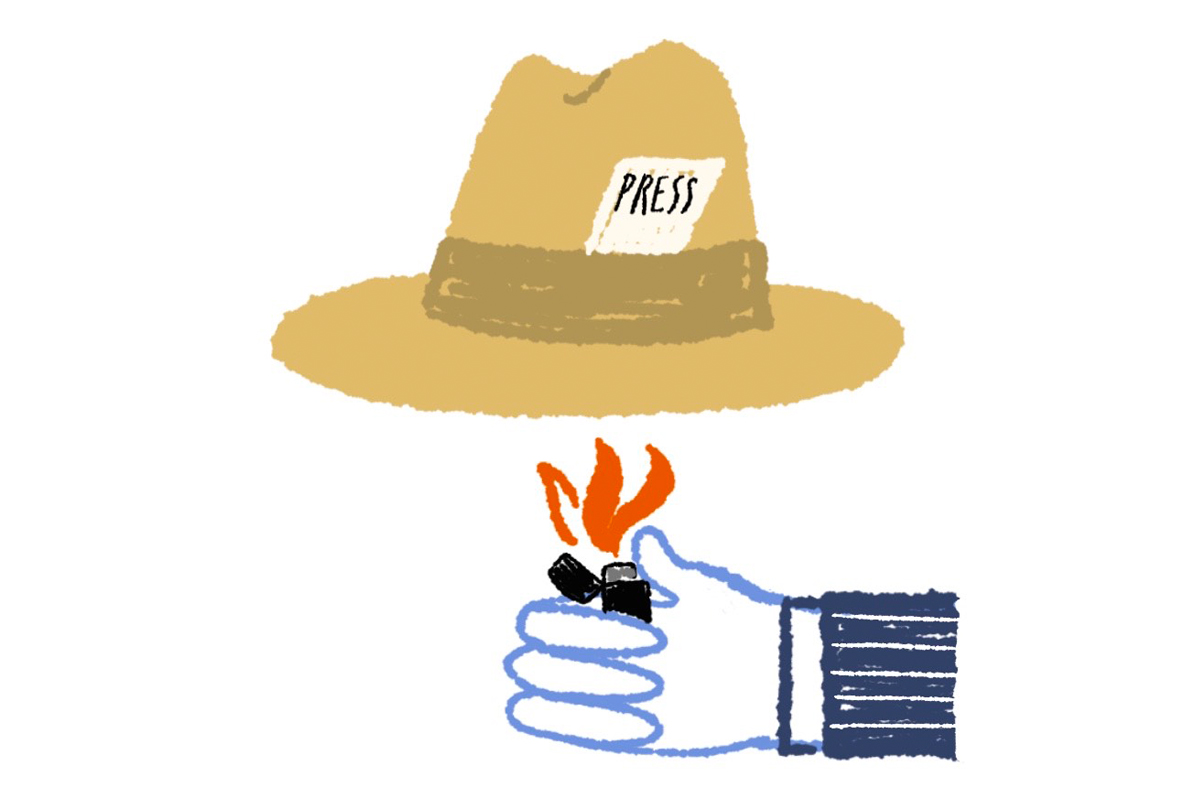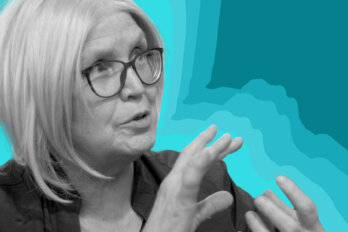
POLITICS / NOVEMBER 2024
If Poilievre Won’t Play by the Rules, Journalists Shouldn’t Take the Bait
News organizations have seen this playbook before
BY ASMAA MALIK
ILLUSTRATION BY JAMIE BENNETT
Published 7:43, SEP. 18, 2024
Pierre Poilievre is no friend of Canadian journalism. The Conservative leader has become known for his antagonistic interactions with reporters from national news organizations. At his first press conference as a federal party leader, in 2022, Poilievre refused to let reporters ask questions and relented only after being loudly called out by Global News chief political correspondent David Akin. He has described the Canadian Press as a “tax-funded mouthpiece to the PMO.” In an X post last October, he called out a CP story that falsely attributed certain remarks to him, leading to three corrections. (Never a banner moment for a news organization, but one might just see press accountability as a good thing.) “Remember that next time they attack me,” he wrote.
If any of this sounds familiar, it’s because we’ve seen it before.
If the Conservatives win the next election, CBC leaders are well aware they should brace themselves for a serious reckoning, once again. In a campaign ploy reminiscent of Stephen Harper’s unfulfilled promise to defund the national broadcaster, Poilievre’s vow to save “$1 billion” by axing funding for the CBC plays well with populist supporters who distrust mainstream media.
Further diminishing the CBC would have cascading effects on Canada’s journalism-starved cities and rural communities, which have seen the closures of hundreds of news outlets in recent years. It would also end its Indigenous-focused news services, including programming in eight Indigenous languages. Poilievre has promised to spare Radio-Canada because of its support for “French-language minorities,” who he says cannot get news and information from a competitive media market. The logic of the Radio-Canada exception is misleading, as there are still several French-language print, digital, and broadcast news options in Canada, although many are based in Quebec, including La Presse, Le Devoir, Le Journal de Montréal, TV5 Québec, and Groupe TVA.
Meanwhile, Poilievre dodges in-depth scrutiny by avoiding network current affairs shows and interviews, where he would likely be asked challenging questions, in favour of his own YouTube channel that features his House of Commons speeches and gives him free rein to expound on economic strategy and to bash the Trudeau government. Through short scripted videos on topics ranging from housing affordability to tax cuts, Poilievre sets the agenda for his media coverage. Outside his platforms, he receives favourable coverage on conservative-leaning sites like The Hub. (Ben Woodfinden, who writes for The Hub, is Poilievre’s new director of communications.) Under a Poilievre administration, such outlets may wield a level of power much like the National Post did in Conservative Party circles during Harper’s leadership.
The former prime minister was notorious for limiting press access to his cabinet members as well as for blocking reporters from covering the repatriation of Canadian soldiers from Afghanistan. In 2006, Harper announced a change to Parliamentary Press Gallery protocol, requiring reporters to sign up to ask questions ahead of time. This led to a walkout of some two dozen journalists fed up with Harper’s attempts to control the press. (Under Trudeau, the practice has been reversed.)
In a similar vein, taking pre-emptive action and collectively refusing to engage on Poilievre’s terms would be the wisest course of action for the country’s press corps. Beyond news conferences and scrums, there are more effective ways for journalists to cover the Conservative leader’s campaign and policies, by strengthening their reporting practices to counter disinformation campaigns and social media noise.
To do that, news organizations need to up their game. The ongoing editorial layoffs at major media companies, including Global News and Bell Media, continue to impact the quality of news Canadians consume. And while the CBC is not, as Poilievre claims, the “propaganda arm” of the Trudeau government, it is in dire need of radical reform. The national broadcaster finds itself significantly under pressure from the economics of attention-fragmented audiences and limited commercialization options. CBC executives appear increasingly disconnected from the pressures their journalists on the ground are facing, especially those from historically mis- or underrepresented communities. It’s crucial for the broadcaster to lean harder into its public service mission to prove its relevance and value.
There are promising signs elsewhere. In Ontario, news organizations such as The Narwhal and the Toronto Star have been holding Premier Doug Ford’s feet to the fire, despite his similarly adversarial relationship with the press, with award-winning reporting on the Greenbelt scandal, which revealed misdeals in his plans to open up protected land for development. A recent Narwhal investigation found Poilievre has had frequent meetings with oil and gas lobbyists despite having called them “utterly useless.”
Under a Poilievre government, news leaders shouldn’t take the bait and allow social media gimmicks and belligerent sound bites to distract them from their work. Reporters will need to move beyond superficial coverage and horse-race headlines to delve deeper into Poilievre’s actions and the impacts of his policies. And if that means walking away from the Conservative leader when he disrespects the value of journalists’ work in our democracy, then so be it.



